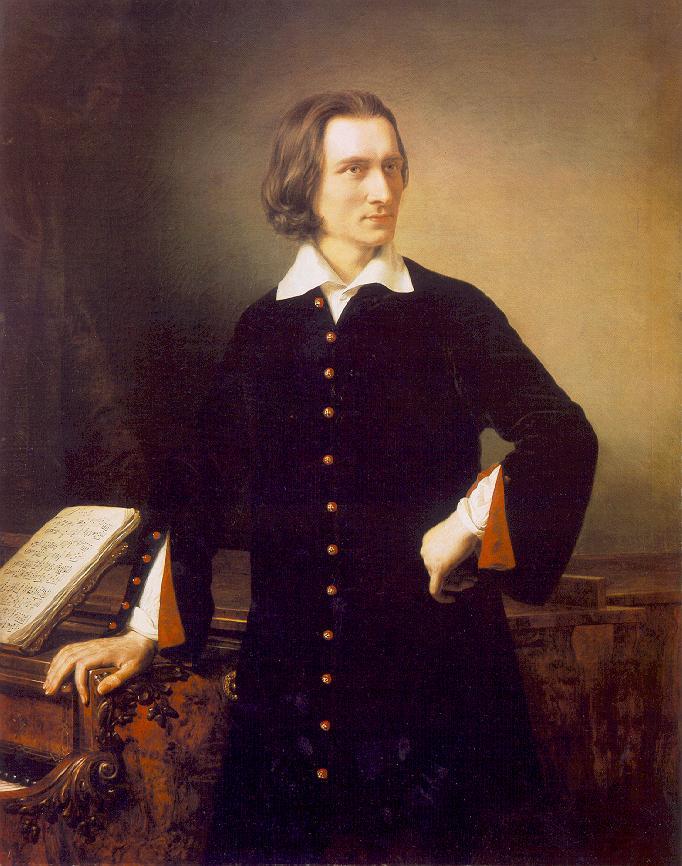Since it is now the 200th anniversary of Franz Liszt’s birth, perhaps I should consider Ezra Pound’s thought about Walt Whitman: “I have detested you long enough.”
“Detested” is probably too strong a word. When I was a boy, I played “Liebestraum” and the Hungarian Rhapsodies and attempted the Transcendental Etudes, thinking that Liszt was one of the greats.
A friend of mine, who was a better pianist, pointed out that Liszt’s piano writing was, in the last analysis, easy to play, because it was written for public display. “If you want difficult, try Beethoven. He didn’t care how the notes fell under the hand.”
Liszt wasn’t too good at Chopin either, I hear. I often wonder how he, and other wildly famous piano players of bygone days, would fare in a competition with recent Juilliard grads. Chopin never did anything so vulgar as to enter musical competitions.
Just because one is a virtuoso pianist does not mean that one can’t compose first-rate music — Ravel and Prokofiev come to mind — but I began to lose interest in Liszt fairly early. The virtuoso pieces seemed too empty and flashy, and the soulful ones too schmaltzy. I was also disappointed by recordings of Liszt’s works — unwise for new listeners who are at the mercy of what may be a bad performance. (You can’t trust record reviews, either.)
The last straw was seeing a movie short of Vladimir Horo- witz playing his own virtuoso variations on “The Stars and Stripes Forever.” He had a great time with the piccolo obligato line, but the whole thing was so over the top that it prompted laughter in the audience and a rethinking of the whole idea of technique as a goal.
Then I heard the great Canadian pianist Glen Gould tell an audience of piano teachers that the instrument could be learned, like simple knitting, in half an hour. And there was the famous Sorel cartoon showing Brahms falling asleep while Liszt played his own works for the younger composer.
Now, I understand, Liszt is making a comeback among the latest generation of piano virtuosos. He does offer a great deal of bang for the buck, but they insist that there’s something more to it.
One of them is Anastasia Antonacos, a fine and exciting pianist who teaches at the University of Southern Maine. She will be featured in “A Celebration of Liszt” at USM’s Corthell Hall on April 1. (For tickets, call 780-5555).
She is interested in Liszt as a pedagogue who influenced generations of pianists, and as a transcriber of orchestral music and opera — making it accessible, in the days before recordings, to anyone who had a piano.
Her concert will represent the composer’s various styles and techniques, including transcriptions, nationalistic works and program music, of which Liszt was a pioneer. She will also illustrate his characteristic use of thematic transformation. I hope she can change my mind.
For those who can’t make the April 1 concert, it will be repeated in June at Novi Sad, Serbia, during the World Piano Conference.
Christopher Hyde is a writer and musician who lives in Pownal. He can be reached at:
classbeat@netscape.net
Copy the Story Link
Send questions/comments to the editors.



Success. Please wait for the page to reload. If the page does not reload within 5 seconds, please refresh the page.
Enter your email and password to access comments.
Hi, to comment on stories you must . This profile is in addition to your subscription and website login.
Already have a commenting profile? .
Invalid username/password.
Please check your email to confirm and complete your registration.
Only subscribers are eligible to post comments. Please subscribe or login first for digital access. Here’s why.
Use the form below to reset your password. When you've submitted your account email, we will send an email with a reset code.